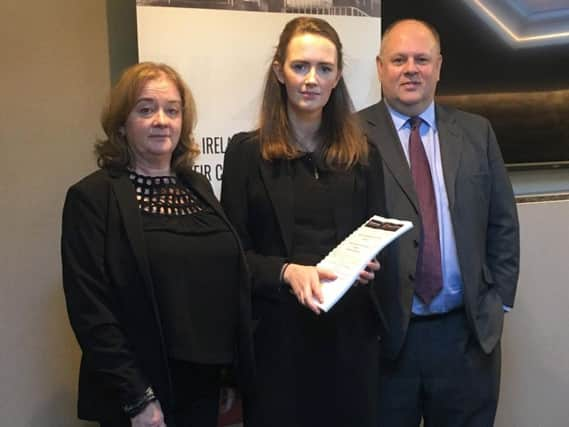Forced adoption report calls for new investigation


The final report of the three-year Clann Project also calls for the Government to give those affected by the scandal statutory rights to access their files.
The Adoption Rights Alliance (ARA), Justice for Magdalenes Research (JFMR) and law firm Hogan Lovells produced the report which includes 77 witness statements taken from conversations with 164 people separated from family members through Ireland's forced adoption system and related historical abuses.
Advertisement
Hide AdAdvertisement
Hide AdThe 154-page report - called Ireland's Unmarried Mothers and their Children - references an unprecedented number of witness statements and makes eight recommendations to the Mother and Baby Homes Commission of Investigation.
Adopted people in Ireland have no statutory right to their birth certificates or their adoption or early life files.
According to the report, there is no independent system in Ireland to ensure survivors of related institutional and historical abuses are provided with their records.
These records are held by religious and private bodies, state agencies and Government departments.
Advertisement
Hide AdAdvertisement
Hide AdThe Clann Project will make its recommendations to the Government early next year.
It called for a new process of investigation to be opened and a state apology to all those affected.
It has also called for redress and reparations, and an introduction of statutory rights and services for adopted people, natural parents, relatives of the deceased and all individuals who experienced abuse, including centralised records and access to archives and tracing services.
It further recommended:
- Acknowledgement by religious orders and church hierarchies
Advertisement
Hide AdAdvertisement
Hide Ad- Establishment of a specific unit to investigate criminal allegations
- Amended statute of limitations and reformed legal aid to enable multi-party litigation
- Active and ongoing memorialisation and research
Claire McGettrick, co-director of the project, said: "The Clann Project witnesses describe a situation of marginalisation, powerlessness and discrimination that persists in 21st century Ireland, because private, religious and state bodies are withholding their personal and family records.
"In addition, the administrative records held by the state and private bodies are being kept entirely secret.
Advertisement
Hide AdAdvertisement
Hide Ad"This is compounding the abuse suffered in the past. No other form of redress will be meaningful without first abandoning this insistence on secrecy and treating people with dignity."
Rod Baker, of Hogan Lovells, said: "There is a surprising reticence by authorities to allow individuals access to basic information about themselves, preferring to preserve the confidentiality of the institutions and their members whose actions caused those individuals great suffering.
"Even the commission set up to investigate those institutions is operating in great secrecy and has refused, without giving any justification for the refusal, to allow public hearings when requested by witnesses in accordance with the Commissions of Investigation Act 2004.
"In this modern age, it is imperative that this pervasive insistence on secrecy is abandoned and those who have suffered most get the information they need."
Advertisement
Hide AdAdvertisement
Hide AdDr Maeve O'Rourke, co-director of the Clann Project, said: "The insistence on secrecy is causing ongoing human rights violations.
"There is a right to truth under European and international law for victims and survivors, and for the general public, where gross human rights violations have occurred in a country.
"It is time for the state to do what is right and tell the truth. It is the first step in restoring dignity to people who have suffered, and in ensuring that these abuses never happen again."